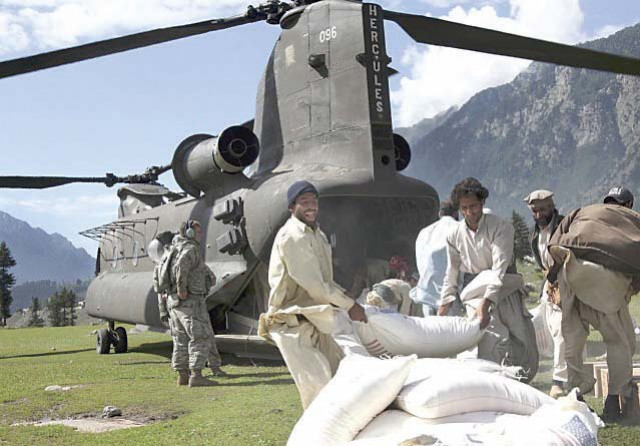‘US not buying off critics’
US dismisses claims it may be contributing generously to flood relief to buy off criticism for drones or Dr Aafia.

“We do not need to buy off criticism surrounding the drones or the situation with Aafia Siddiqui. We are not here for glory or kind comments but to help those suffering,” said William J Martin at a press briefing on flood relief efforts held at his residence.
Touching on the topic of the reformed GST deadline of November 1 being formally linked to aid, he said “we don’t want to tie humanitarian assistance to political events.”
Discussing American efforts to the flood relief, he said thus far the US government has committed a total financial support of $430 million in civilian aid and in-kind military assistance.
The consul general said that 50 per cent of the aid is routed through the UN and its various branches such as the Unicef and UNHCR.
When asked whether a large chunk of the money was not given to the government due to a trust deficit over the allocation of funds, he disagreed. “It is only natural for us to use the UN to route the money since they are specialists in this field and were already present on the ground involved in other projects,” he said.
Martin stressed that while Washington wanted to help and would continue to do so, the onus was also on the Pakistanis to help their own people.
“It is unreasonable to think the international community can pay for everything when dealing with a tragedy of this magnitude.” Elaborating on a mechanism for the tax structure in the country, Martin said while they were also interacting with the government to work out a feasible plan, it was organisations like the IMF and the ADB which played a pivotal role in the discussions.
He added that the response received from the Pakistan government over the implementation of tax measures for the elite in the country was mixed and joked that, “Nobody really wants to pay taxes.”
Post-flood situation
Martin highlighted the need to focus on the post-flood scenario and the rehabilitation efforts in the country. He said the US was working closely with the local government as they are the ones who are prioritising the requirements and efforts.
He advised a session between the federal and the provincial governments in which a number of issues should be sorted out in order to formulate a realistic rehabilitation plan.
“The magnitude of the floods is beyond belief,” he said, “and logistics is a huge problem, many are trapped in remote areas and we have a tough time reaching them.”
On poverty, he said, the US gave to the Benazir Income Support Programme (BISP) as well but pointed out that eradicating poverty was an internal issue. He did add, however, that education holds the key to a number of the country’s poverty problems. “Many Pakistanis still have not understood the importance of going to school as I witnessed when I visited the relief camps,” he said.
When questioned if Washington’s support for President Asif Ali Zardari was waning, the US consul general said, “Let there be no doubt that the US supports a democratic government in Pakistan.” Any political change in the country is up to the Pakistanis.
Published in The Express Tribune, October 1st, 2010.



















COMMENTS
Comments are moderated and generally will be posted if they are on-topic and not abusive.
For more information, please see our Comments FAQ